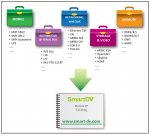You are currently viewing SemiWiki as a guest which gives you limited access to the site. To view blog comments and experience other SemiWiki features you must be a registered member. Registration is fast, simple, and absolutely free so please,
join our community today!
Success with Open-Source Formal Verification
The dream of 100% confidence is compelling for silicon engineers. We all want that big red button to push that magically finds all of our bugs for us. Verification, after all, accounts for roughly two-thirds of logic design effort. Without that button, we have to create reference models,… Read More
Dynamic event-based simulation of RTL models has traditionally been the workhorse verification methodology. A team of verification engineers interprets the architectural specification to write testbenches for various elements of the design hierarchy. Test environments at lower levels are typically exercised then … Read More
This summer, I got the opportunity to work as a Formal Verification Intern with Axiomise for six weeks. I’m a keen designer and love working in design and architecture. Although, I’ve not started my professional career yet, I have done most of my projects as a designer in my undergraduate and postgraduate studies.
Having said that,… Read More
After a few decades of watching formal verification techniques being applied to SoC designs, it certainly continues to be a growth market for EDA vendors. In the first decades from 1970-1990 the earliest forms of formal tools emerged at technical conferences, typically written by University students earning their Ph.D.s, … Read More
Verification Challenge
As chip design complexity continues to grow astronomically with hardware accelerators running riot with the traditional hardware comprising CPUs, GPUs, networking and video and vision hardware, concurrency, control and coherency will dominate the landscape of verification complexity for safe … Read More
In the technology industry, we’re all used to the hype about the latest and greatest. Semiconductor IP participates in the over-drive news cycle from time to time as well. So, when I see a company that has real, solid credentials but has resisted the temptation to over-hype, it gets my attention. I had an experience like this recently… Read More
Formal verification has always appeared daunting to me and I suspect to many other people also. Logic simulation feels like a “roll your sleeves up and get the job done” kind of verification, easily understood, accessible to everyone, little specialized training required. Formal methods for many years remained the domain of … Read More
Verification engineers are the unsung heroes making sure that our smart phone chips, smart watches and even smart cars function logically, without bugs or unintended behavior. Hidden bugs are important to uncover, but what approach is best suited for this challenge?
With the Universal Verification Methodology (UVM) there’s… Read More
I attended Oski’s latest Decoding Formal event a couple of weeks ago and again enjoyed a largely customer-centric view of the problems to which they apply formal, and their experiences in making it work for them (with Oski help of course). From an admittedly limited sample of two of these events, I find them very representative of… Read More
Last week I sat in on Oski’s latest in a series of “Decoding Formal” sessions. Judging by my first experience, they plan and manage these events very well. Not too long (~3 hours of talks), good food (DishDash), good customer content, a good forward-looking topic and a very entertaining wrap-up talk.… Read More









